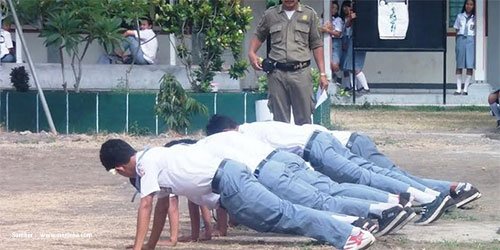Implementation of Reward and Punishment on Improving Learning Motivation

Reward and punishment (reward and punishment) in pedagogy is seen as part of the educational process. Provision of punishment aims to provide a deterrent effect and prevent the continued negative behavior and rewards are useful for reinforcement of positive behavior. Punishment and reward are also known in religious teachings including Islam.
In Islam is taught about the existence of heaven and hell. Anyone who does bad deeds or denies the teachings of Allah is a sin (given punishment), and anyone who does good deeds (positive) and obeys orders and leaves his prohibitions, will be rewarded or rewarded.

Actually human nature at first is good. This means that man does not commit a crime. But evil is something beyond its character. In principle, human nature is good and tends to the good. He commits a crime because it is wrong, wrong, not knowing, or external elements from the outside that affect it. Among the scholars who present this theory is Socrates. He says that, every human being (including teenagers) has a desire to do good. While the crimes he may have done, the result of ignorance, and the bad of fate. Because, anyone who knows the ugliness, sure, certainly impossible to do it.

Abdurrahman Saleh Abdullah says the relevance of punishment (Punishment) and reward (Reward) should be seen towards human nature or nature through its influence on individual security and the choices made, then this will refer to the test of motivational power. According to him also with regard to rewards and sources of reward, it would be confirmation in connection with the excess rewards that will be received in the hereafter. Teachers or educators who want the implementation of reward methods to be effective, should pay close attention to their implementation, in addition to students not only expecting to be praised in the implementation of the method.

In connection with the provision of punishment, Ibn Hajar al-Haitami in his book Tahrir al-Maqal said that teachers or educators have no right to impose corporal punishment on their students unless they get permission from their parents. Meanwhile, according to al-Qabisi and Ibn Sahnun (Muhammad ibn Abdal Salam bin Said) said that educators should not impose punishment when angry, because it may be only because the desire of his passions and other principles is that educators can not punish on the basis of reasons personal.
Ibn Khaldun in Muqaddimahnya give consideration in the implementation of punishment of students to be useful in order to eliminate the negative consequences. Emile added that the application of punishment should not be merely a threat to ensure the implementation of the rule but as an election or restoration of the offense that places the consequences of the violation back in its proper place.

Similarly, punishment for example when the student who is often late to the class then called to the room BK (Guidance and Counseling) for questioning and told to sweep the page futsal, when students ditching from school with drying in the yard, students make a noise in class when the learning activity is given a reprimand or called by the teacher in question persuasive, or when students miss dzuhur prayers in congregation without a rational reason to clean the floor of the mosque.

Likewise, when the student commits repeated violations, the application of punishment is adjusted to the type of offense, such as: ditching more than three times then the school called the parents of students for questioning and when the students ditching more than seven times then apply a week-long suspension by making a report every day to school at the last hour of KBM (Teaching and Learning Activities).

With rewards and punishment being applied for approximately 3 (three) years, ideally the students are motivated to study religion, obey the school rules and behave as expected. The phenomenon that the authors found, the provision of rewards and punishment that has been going on already shows signs of changes in behavior and symptoms of the growth of students' learning motivation, proven many students who follow the activities of Friday prayers, activities MABIT (Night Bina Takwa), infak every day jum'at, running cleanliness of the mosque and class, entering the class on time, uniformed neatly, and some students ask for lesson when the teacher is unable to attend.
